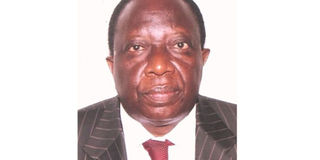On Onyango Obbo’s ‘Rise of the Kampala City State’

Mr William G Naggaga is an economist, administrator and retired ambassador.
Celebrated columnist Charles Onyango Obbo’s comment titled:
in the Daily Monitor of June 28 was an eye-opener to the dynamics taking place in Kampala and Buganda.
Many of us have many times reflected on the pace at which Kampala City was evolving. At the moment, nobody actually knows the real boundaries of Kampala City. By that I don’t mean the artificial geographical markings, but the economic reach of the city.
The entire length of Entebbe Road from Clock Tower to State House and Entebbe International Airport, is one continuous and unbroken chain of buildings, stretching beyond what the eye can see on both sides of the road. The same is becoming increasingly true of all roads leading to Kampala.
The new development is a product of government’s failure to diversify economic development and the absence of a deliberate policy to promote growth of other cities across the country.
Jinja, once Uganda’s premier industrial town, was ‘cannibalised’ of its industries and left to decay. It should by now be Uganda’s second largest city with a population of at least 2 million people.
Mbale, Gulu, Mbarara and Arua should also have risen to city status with industries, universities, airports and vibrant populations, rich enough to spiral further industrialisation and development.
In the 1960s, for instance, people in Mbale bought everything from Mbale, including cars, which were fully registered there, as indeed did residents in other towns. Uganda was then a country of choices - you chose where to go to school, where to work and where to buy goods and services. Not everything was driven by Kampala, which is now the alpha and omega.
Although Uganda has been divided into more than 112 districts, people in those districts still have to come to Kampala for almost all the services they need thus negating the reason for their creation.
The rise of Kampala is not only the “end of Buganda” but “the end of Uganda’’. The city state in all its ramifications has swallowed up the entire country to the detriment of us all. This would not have happened if Uganda had adopted a federal system of governance or a fair distribution of resources.
The endless expansion of Kampala State has implications in many ways. In Buganda, it has resulted in gobbling up rich agricultural land, which has been turned into urban dwellings and hence the ‘migration’ of coffee and bananas.
The country as a whole has not had well defined zoning policy for land usage. Arable land should have been left for agriculture. Muammar Gadaffi once remarked to Idi Amin that: “Give me Uganda and I will feed the world. What you have here is real wealth. The oil we have in Libya is nothing”, or words to that effect. (Countries like Israel have imported soil to supplement their sandy soils and have ended up growing enough food for themselves and even exporting some to other countries). It is ‘sacrilege’ to misuse rich soils by putting housing estates on it.
Because the economy of Uganda is concentrated in Kampala, everybody ends up making Kampala his first home. Wealthy businessmen, retired civil servants and retired corporates spend their retirement benefits in Kampala, with little trickling down to their districts of origin. No sensible businessman/woman will place his/her investment away from this ‘moneyed class.’
The solution, is to return to the drawing board in order to diversify and spread cities and industries across the country. Let the whole country experience growth and not concentrate it in a few places in particular Kampala.
Cities do not just grow, they are deliberately created or ‘planted’. I visited Brasilia, the capital of Brazil, a couple of times and saw how a massive city was created in a remote scrub land, deep in the middle of this vast country. It has eased pressure on Rio de Janeiro and Sao Paulo, Brazil’s two largest cities.
Mr Naggaga is an economist, administrator and retired ambassador. [email protected]


